What can Switzerland learn from your country of residence when it comes to organ donation?
Switzerland has decided in a referendum to change the organ donation law from from explicit to presumed consent. In the future, unless you actively opt out during your lifetime, you will be presumed upon death to have been in favour of donating your organs.
But there is still a long way to go before the implementation of the change in legislation, which will not come into effect before 2024.
Switzerland could benefit from the experience of countries where presumed consent for organ donation is common, which is the case in several European countries.
How is organ donation regulated in your country of residence? And what can Switzerland learn from it?
From the article Voters give consent to new ‘opt-out’ system of organ donation
It is understandable that the consent method for organ transplants was passed by referendum under the "presumed consent method" because of the trends of the times. What is important is that the consent method is decided through a referendum. This is important because it avoids a situation in which citizens who have no knowledge of organ transplantation opt out and participate in the organ transplantation system. A presumed consent system based on national education and the understanding and consent of each citizen is a desirable system for a country. Japan should learn from this process.
臓器移植の同意方式が国民投票で「推定同意方式」で可決されたのは時代の流れから理解できる。重要なことは、同意方式が国民投票を経て決まるという事だ。臓器移植について知識のない国民がオプトアウトで臓器移植のシステムに参加してしまっているという事態は避けられるからだ。国民的な教養と国民一人一人の理解と納得があっての推定同意方式は国として望ましいシステムだ。日本もこのプロセスを学ぶべきだろう。
The basis of a citizen relationship in a democratic environment is individual freedom in correlation with the obligations of the individual versus the consensus of society.
The obligation to declare one's personal decisions, such as the obligation to disclose one's choice of vote for example, only opens the way to a dictatorship.
A decision of choice, post mortem, made arbitrarily, even after a referendum, is probably unconstitutional?
La base d’une relation citoyenne en milieu démocratique et la liberté individuelle en corrélation avec les obligation de l’individu versus le consensus de la société.
L'obligation de declaration de ses décisions personnel, comme celle de la divulgation de son choix de vote par example, ne font qu’ouvrir la voix vers une dictature.
Une decision de choix , post mortem , faite arbitrairement, même après un referendum , est probablement anticonstitutionnel?
That the state, or in this case the democratic majority, determines the body of the individual is a scandal.
Dass der Staat, oder hier die demokratische Mehrheit über den Körper des einzelnen Individuums bestimmt ist ein Skandal.
When forced vaccination was posed in countries with similar law, like the “no jab no job” kind of thing, people withdrew their consent for organ donation. So apart from the fact that this law can save more lives and reduce organ trafficking, it is a good resource to remind the government that my body is my choice.
Those of us who have already prepared the trip to the other world have nothing to carry in our pockets, whoever we are, we all arrive at the same place, but if someone with the last breath can do a favor to someone who needs something to extend a few more years of life, then organ donation becomes a humanitarian attitude with a very social feeling at the service of those who really need it.
I fully agree with this project.
Willy Saavedra
Los que tenemos ya preparado el viaje al otro Mundo no tenemos nada que llevar en el bolsillo, sea quien sea todos llegamos al mismo sitio, pero si alguien con el último respiro puede hacer un favor a alguien que necesita algo para alargar unos años mas de vida, pues la donación de órganos se convierte en una actitud humanitaria con un sentimiento muy social al servicio de los que realmente lo necesitan.
Yo estoy plenamente de acuerdo con ese proyecto.
Willy Saavedra
In China, organ donation is not a commonly recognized practice, but people can still choose to donate their organs. More and more young people in China are now taking an interest in organ donation and volunteering to donate their organs after death.
在中国,器官捐献并不是一个被普遍认知的事情,但是人们仍然可以选择器官捐献。现在越来越多的中国年轻人开始关注器官捐献并且自愿在死后捐献器官。
I do not know how effective the mind is, whether it is operated by the family and surrounding circumstances, or is it really a choice? Whether the mind can really refine one? What is the benefit of the body after death? Does the neighborhood really prefer to prey on its body by worms or help someone who may die only because of the inability of their member to work? This situation is selfish. Only a jolt of the head will be won by the dead.
لا أدري مدى فعالية العقل وما إذا كان مُسيّرا من العائلة والظروف المحيطةأم أنه حقا مخيّر؟ وما اذا كان في مقدور العقل تهذيب المرء حقا؟ ما فائدة الجسد بعد الموت؟ وهل يُفضّل الحيّ حقا افتراس جسده من قبل الديدان أم مساعدة آخر قد يموت فقط لعجز عضو لديه عن العمل؟ إن الرفض في هذه الحالة أنانية لن تُكسب الميّت سوى هزة رأس أسفا.
In Quebec, as elsewhere in the world, there is a shortage of organs because potential donors are very rare. Only 1.4% of hospital deaths meet the medical and legal criteria for organ donation. This is why every consent counts.
So let's talk about it! That's what Life Chain is doing, a charitable organization
is helping to save lives and improve the quality of life of those who are ill through its innovative school-based organ and tissue donation education program in English as a Second Language. The program provides an opportunity to develop English language skills and knowledge while addressing an important social issue: organ and tissue donation.
This unique and intergenerational program brings together the health and education sectors to ultimately save more lives. The human values that are conveyed encourage young people to take responsibility by taking concrete action (bringing the discussion to the family) that demonstrates a commitment to the life of their community.
All the information is provided in order to get the students to think and form their own opinions. The goal is not to convince, but to educate and inform students so that they can make an informed personal decision and discuss it with their family.
From then on, they become ambassadors for the family discussion. Should a brain death occur, having expressed one's wishes on the subject greatly helps the family make the best decision at the worst time of their lives.
Educated youth = Informed families = More lives saved
According to the teachers, the subject brings out the best in young people, because at the heart of the program, we talk about beautiful values such as generosity, altruism, social commitment, and especially respect for life.
Organ donation education: A golden opportunity to promote healthy lifestyle habits!
What does this have to do with healthy living?
In addition to raising awareness about organ and tissue donation, the organization aims to raise awareness about the inestimable value of a healthy body and the importance of taking care of it by choosing healthy lifestyle habits. In a context where the demand for organs for transplantation greatly exceeds the supply due to chronic diseases, it is essential to address the health problems related to poor lifestyle habits that affect vital organs: heart, lungs, kidneys, liver, etc.
The principle of organ scarcity increasing its value is highlighted through the testimonies of people who have received a second chance at life through organ donation. The scarcity of organs makes young people aware of their key role as ambassadors of the family discussion (every consent counts) and also to take concrete actions for the adoption and promotion of healthy lifestyle habits.
What a great way to celebrate life!
To learn more, visit chainedevie.org
Lucie Dumont president, founder of the Life Chain
luciedumont@chainedevie.org
Au Québec comme ailleurs dans le monde il y a une pénurie d’organes car les donneurs potentiels sont très rares. Seulement 1,4 % des décès à l’hôpital correspondent aux critères médicaux et légaux qui entourent le don d’organes. C’est pourquoi chaque consentement compte.
Alors il faut en parler! C’est ce que fait Chaîne de vie, un organisme de bienfaisance
qui contribue à sauver des vies et à améliorer la qualité de vie de personnes malades grâce à son programme éducatif novateur sur le don d’organes et de tissus en milieu scolaire et ce, dans le cadre du cours d’anglais, langue seconde. Ainsi, il devient possible de développer des compétences et des connaissances en anglais tout en abordant un enjeu important de société : le don d’organes et de tissus.
Ce programme à caractère unique et intergénérationnel réunit les secteurs de la santé et de l’éducation pour ultimement sauver plus de vies. Les valeurs humaines qui y sont véhiculées incitent les jeunes à se responsabiliser en posant un geste concret (amener la discussion en famille) qui démontrent un engagement à la vie de leur communauté.
Toute l’information est fournie afin d’amener l’élève à réfléchir et à forger sa propre opinion. Le but n’est pas de convaincre, mais de sensibiliser et d’informer les élèves afin qu’ils puissent prendre une décision personnelle éclairée et en parler avec leur famille.
Dès lors, ils deviennent les ambassadeurs de la discussion en famille. Si un décès en mort encéphalique survenait, le fait d’avoir exprimé ses volontés sur le sujet aide grandement la famille à prendre la meilleure décision au pire moment de leur vie.
Des jeunes sensibilisés = Des famille informées = Plus de vies sauvées
Selon les enseignants, le sujet vient chercher ce qu’il y a de meilleur chez les jeunes, parce qu’au cœur du programme, on parle de belles valeurs comme la générosité, l’altruisme, l’engagement social, et surtout le respect de la vie.
L'éducation au don d'organes : Une occasion en or de promouvoir les saines habitudes de vie!
Quel est le lien avec les saines habitudes de vies?
En plus de sensibiliser les jeunes au don d’organes et de tissus, l’organisme vise à faire prendre conscience de la valeur inestimable d’un corps en santé et de toute l’importance d’en prendre soin en optant pour de saines habitudes de vie. Dans un contexte où la demande en organes pour la transplantation dépasse largement l’offre en raison notamment des maladies chroniques, il est essentiel d’aborder les problèmes de santé en lien avec les mauvaises habitudes de vies qui affectent les organes vitaux : cœur, poumons, reins, foie, etc.
Le principe de la rareté des organes en augmente sa valeur est mis en lumière grâce aux témoignages de personnes ayant reçu une deuxième chance à la vie suite à un don d’organes. La rareté des organes fait prendre conscience aux jeunes de leur rôle clé en tant d’ambassadeur de la discussion en famille (chaque consentement compte) et aussi à poser des gestes concrets pour l’adoption et la promotion de saines habitudes de vie.
Quelle belle façon de célébrer la vie !
Pour en connaître davantage visitez chainedevie.org
Lucie Dumont présidente, fondatrice de Chaîne de vie
luciedumont@chainedevie.org
I agree with presumed consent.
I know many people in Japan are not comfortable with taking a scalpel to the body even after death.
I think it would be good if there is something useful after death.
I just hope we don't get into a situation where we want to turn our backs on the final goodbye.
推定同意に賛成です。
日本では死後でも体にメスを入れることに抵抗がある人が多いと思いますが
私は死後に役に立つことがあればいいかなと思います。
ただ、最後のお別れに目を背けたくなる状況にならなければいいなと思います
the rapid transport of the organs.
der schnelle Transport der Organe.
Thanks for the answer, Peter Huwiler! In which country is that? And is there a reason why the fast transport works so quickly there?
Danke für die Antwort, Peter Huwiler! In welchem Land ist das? Und gibt es einen Grund, weshalb der schnelle Transport dort so schnell funktioniert?
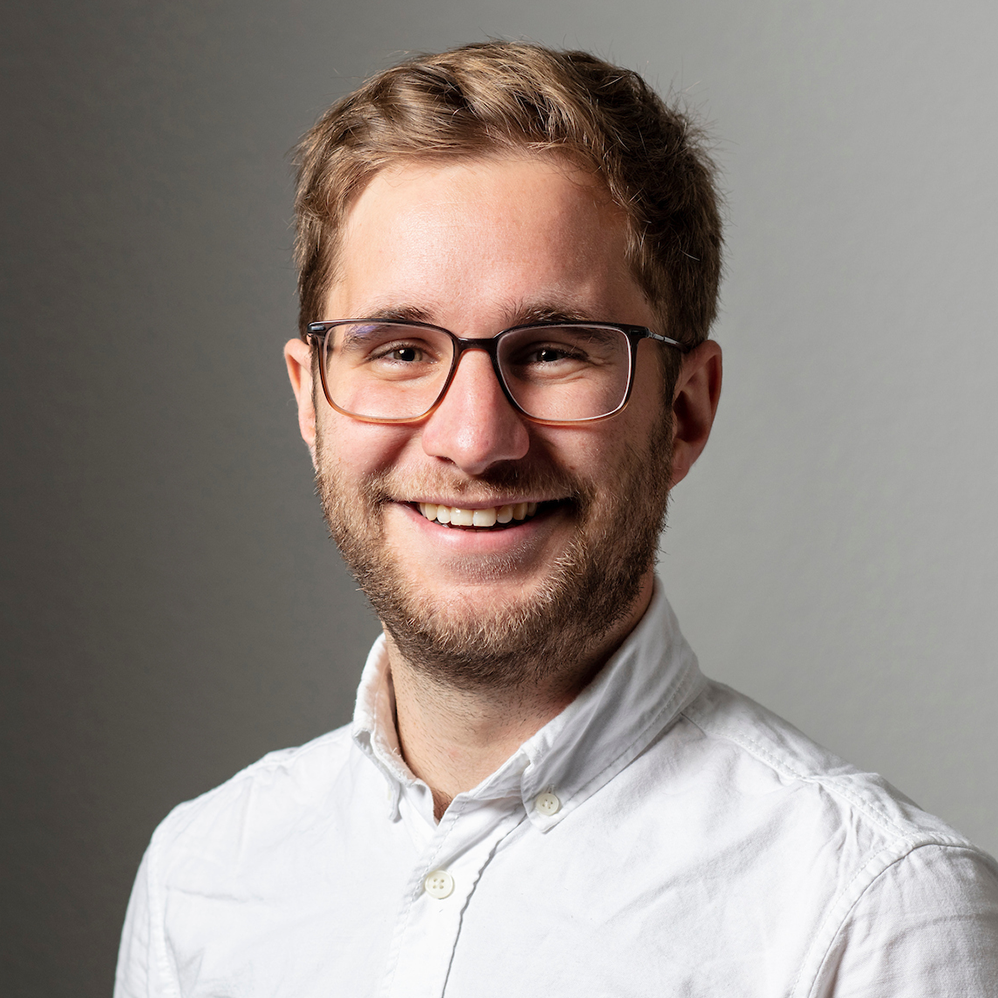
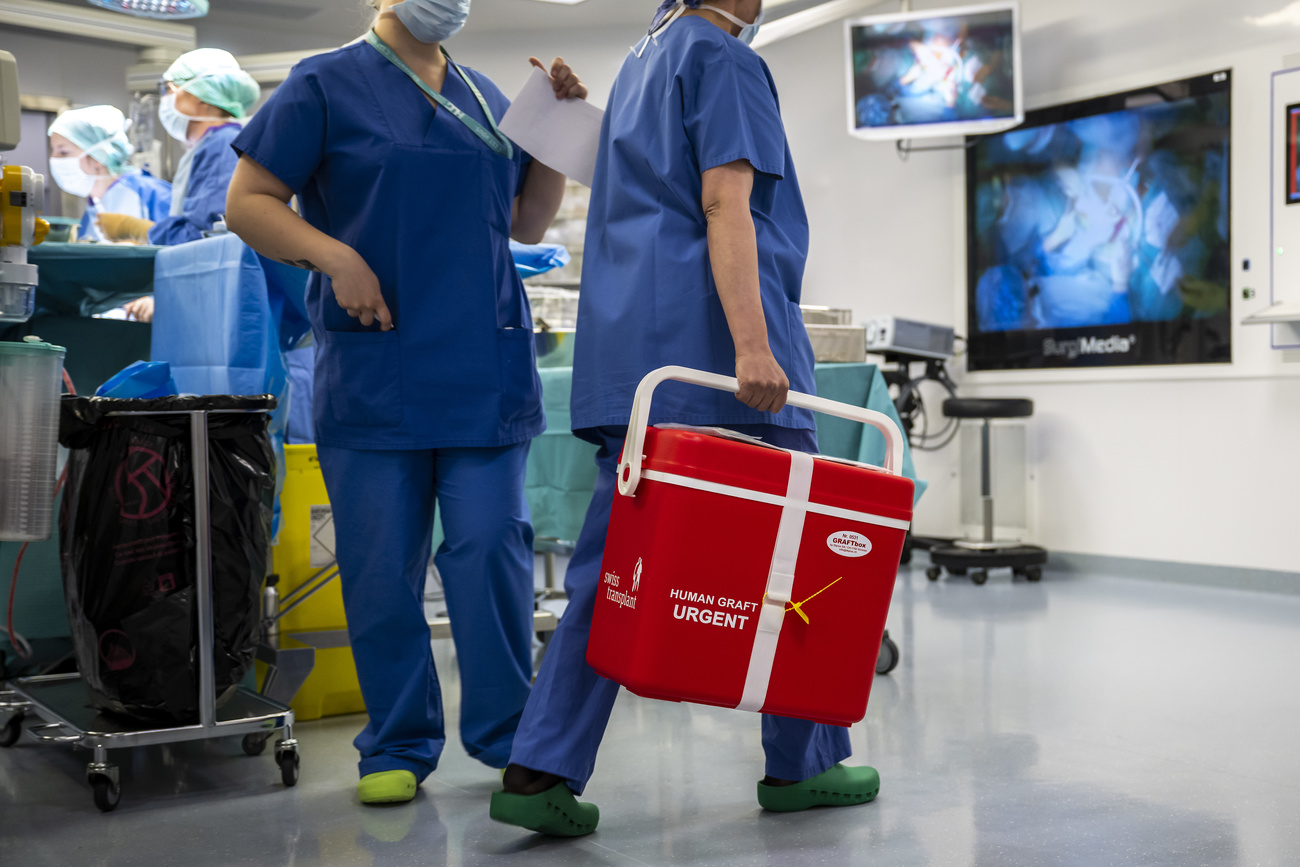
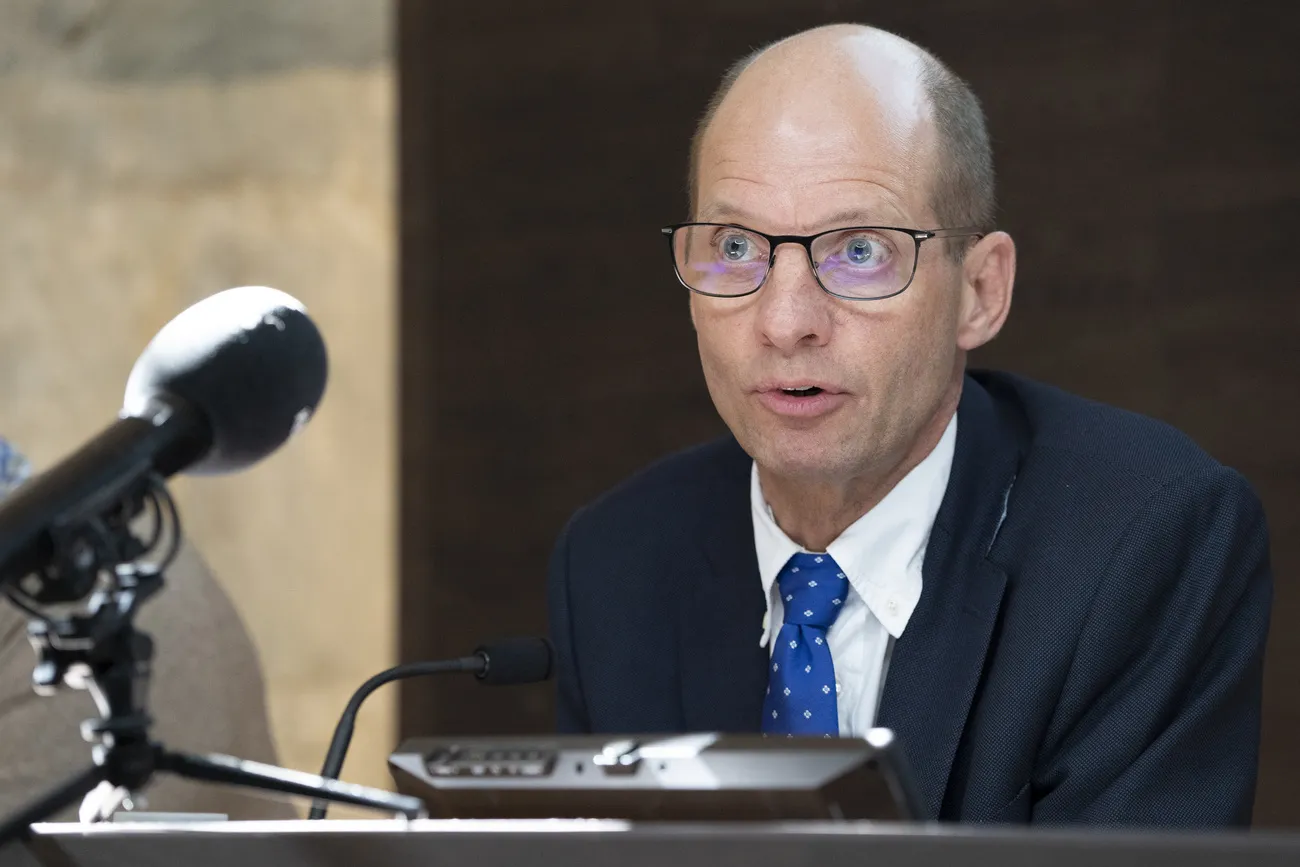
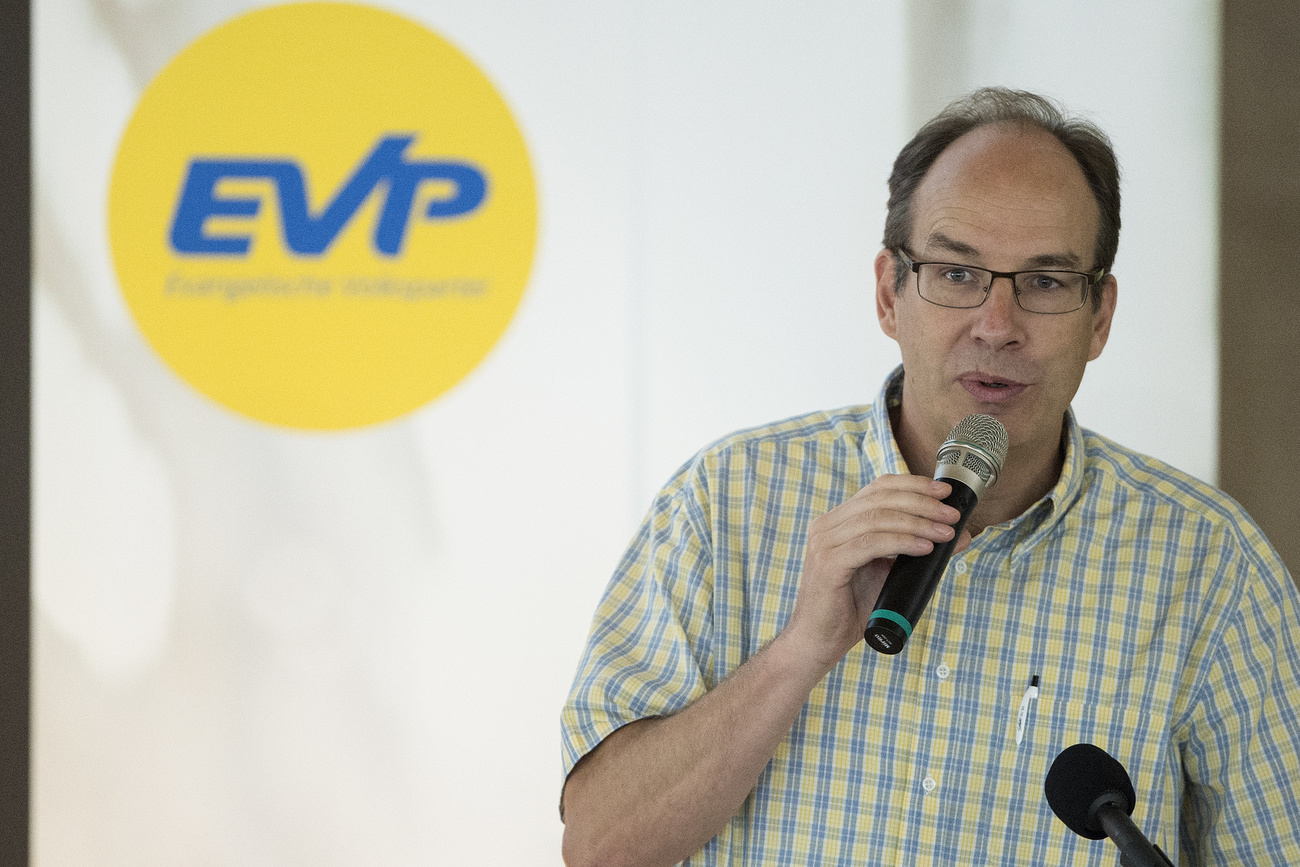
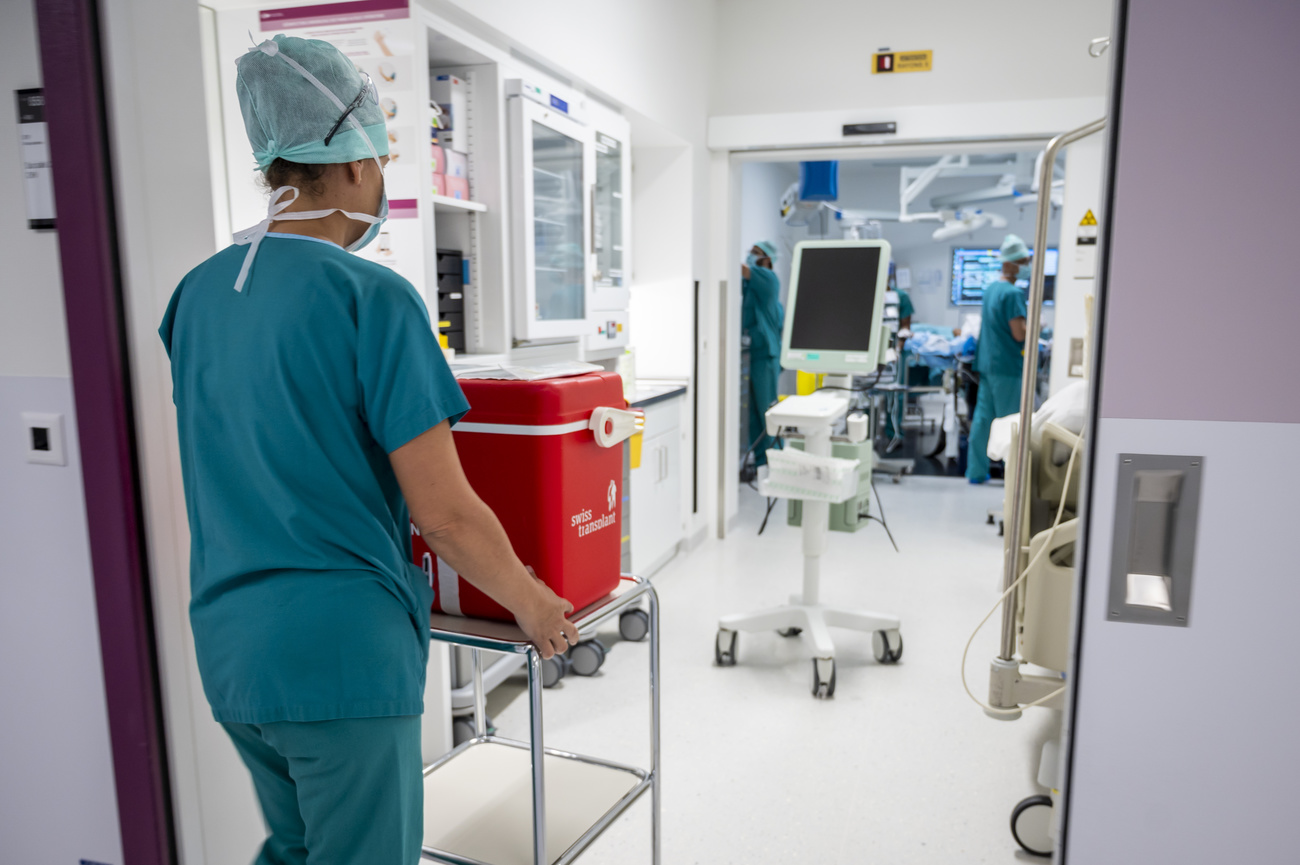
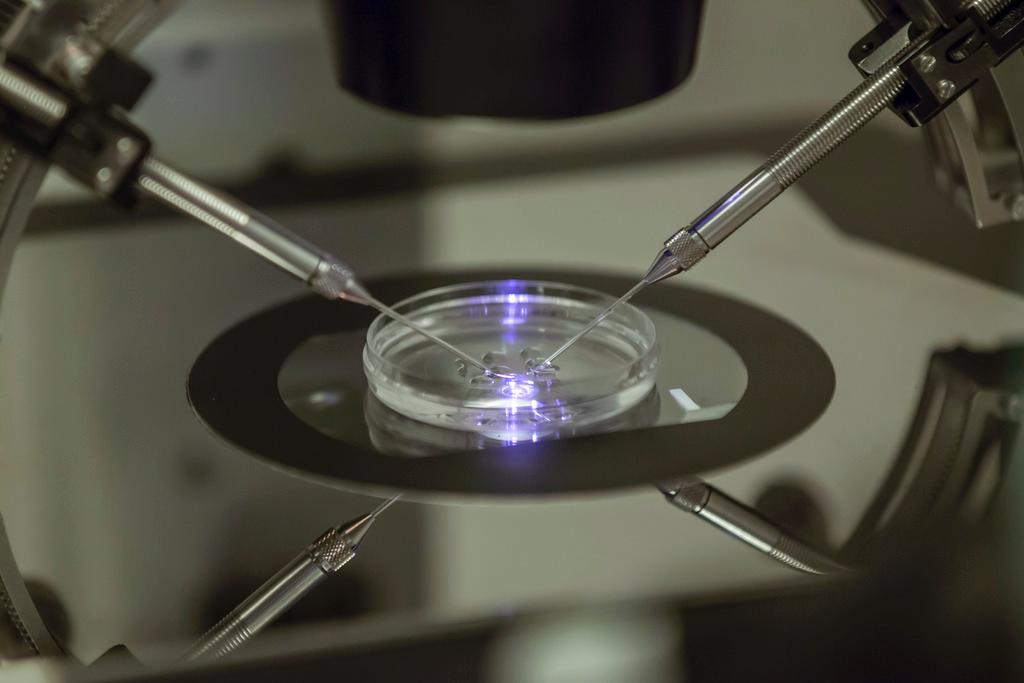

You can find an overview of ongoing debates with our journalists here . Please join us!
If you want to start a conversation about a topic raised in this article or want to report factual errors, email us at english@swissinfo.ch.